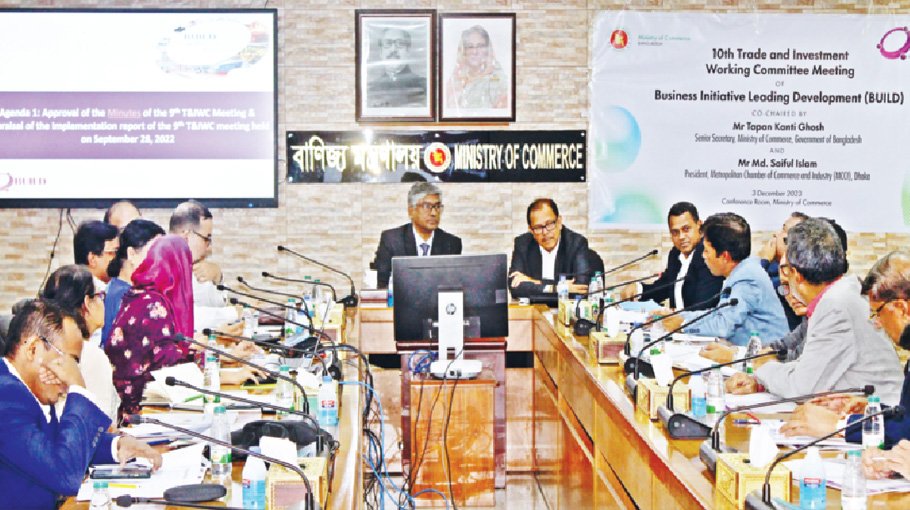Prospect for diversifying export to UK China markets bright
Experts at BUILD Trade and Investment WC meeting

Experts at a meeting asserted the potential of diversifying exports in the markets of the UK and China.
The meeting also emphasised the ease of doing business and reduced regulatory burdens and documentation processes.
The meeting of the 10th Trade and Investment Working Committee of BUILD was held on Sunday at the Conference room of Ministry of Commerce, orgaised jointly by MoC and BUILD.
Co-chaired by the Sr. Secretary Tapan Kanti Ghosh and Md Saiful Islam, President of the Metropolitan Chamber of Commerce and Industry (MCCI), the meeting reiterated attracting new investments, fostering technological advancements, and promoting diversified product exports, particularly in the key markets where market access benefits are available.
Two policy papers titled “DFQF Market Access to China-Policies and Measures to Increase and Diversify Exports” and “UK’s DCTS: Policy Measures to Escalate Export to the UK” were presented.
BUILD CEO Ferdaus Ara Begum reported on the progress of the 9th meeting, highlighting the implementation of eight out of 27 proposed reforms, with nine currently in progress.
Acknowledging the collaborative efforts of the MoC, Local Government Division, and Register of Joint Stock Companies (RJSC), she expressed gratitude for the successful implementation of 5-year trade licences, Export and Import licences and the initiation of online Trade Licence services and information dissemination through websites of RJSC etc.
The MOC Senior Secretary emphasised the need to reduce documentation requirements, digitise trade licences, review the imposition of income tax on trade licences, etc. Dr Malay Chowdhury, Additional Secretary, LGD, informed the meeting that five documents are presently required to apply fora trade licence.
During discussions, it was proposed to streamline the trade licence document requirements to three: NID/Birth Certificate, nature/types of business, and proof of business ownership.
The Registrar of RJSC was informed that RJSC is working on complete automation of its services. A meeting will be held soon to finalise business categories for simplifying model MOA. Besides, RJSC is in the process of integrating with all concerned organisations like NBR, MOC, and Bangladesh Bank through software upgrades.
In response to BUILD’s proposal, the NBR Joint Commissioner informed that the renewal of the Bonded Warehouse Licence will be three years instead of two years for all sectors, which NBR will gazette soon. The MoC endorsed the formulation of a Sub-contracting Policy for all sectors, likeRMG for supporting non-RMG exports.
The meeting identified that about 137 products were exported, which are not included in the 98% DFQF list. The export of these 137 products was USD 211 million or 31% of the total export (USD 677 million) to China, of which 34 products (USD 128.30 million) from Oven RMG. Due to a lack of compliance and standards, low technology, and a lack of post-export services, exports could not be increased.
The senior Secretary appreciated the study findings. Following the emerging situation after LDC graduation, he suggested further analysis of the duty-free scenario as per the APTA list to get a clear picture of the preferential export of products from Bangladesh.
BUILD CEO Ferdaus Ara Begum shared insights from a study on the UK’s DCTS(Developing Countries Trading Schemes), emphasising the benefits it offers to LDCs, including Bangladesh under Comprehensive Preference (CP). Bangladesh will enjoy Enhanced Preference (EC) after Graduation and transition period under this scheme, which is more liberal than EU GSP+.
In this study, BUILD identified potentials of high value-added RMG, agro and agro-processed products, leather goods, bicycles, plastics, toys, batteries, furniture, pharmaceuticals, etc., for exports to the UK.
MCCI President Md Saiful Islam, informed that the sample import process has been simplified, and they get benefits from it.
He requested NBR to allow LFMEAB to issue online UD and co-efficient independently.
AKM Ahmedul Islam Babu, Director, BASIS, requested more connectivity with Japan, South Korea and India to increase strength, capability and skills to increase access to the global value chain as well as flourishing e-commerce businesses.



